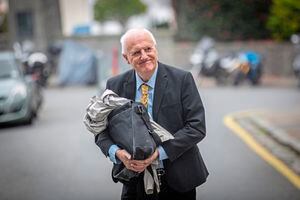‘Assembly debates too many issues to death’
Chief minister Peter Ferbrache surprised islanders and maybe his political colleagues this week by admitting in the States Chamber that the government was failing ordinary islanders. Simon De La Rue asked him how, why, and what he intended to do about it

Who would you say the States has failed?
'I was talking about the ordinary working people of Guernsey, the people who didn’t have the bank of mum and dad, who weren’t from a self-interested group, who were working hard and who were trying to improve their lives. They’re aspirational. We haven’t done enough for them.'
Why do you think you’ve not done enough? How have you failed islanders?
‘I think too much effort has been spent on peripheral issues rather than the main issue.
‘I mean, a key issue for people is housing. We, going back over quite a few assemblies, have done insufficient in relation to that. We’ve got the highest rents we’ve probably ever had, in real terms, even forgetting inflation, and the highest house prices we’ve ever had. If you were to advertise a property now, you’d get 15 people contacting you tomorrow saying can we please rent it, and you’d probably end up renting it for more than you were originally going to rent it for. Same with the sale of your house.
‘If you haven’t got a house, or a flat – if you haven’t got decent accommodation – you are struggling to live a decent life.
‘I’m not putting all my eggs in the housing basket. But it’s in relation to that.’
Deputies Ferbrache, Tina Bury and Gavin St Pier recently conducted a Q&A session with students at the Sixth Form Centre.
‘Gavin said then, we’ve got less social mobility than we’ve probably had for a long time. I agree with that. You know, I’m a working-class kid. I had great social mobility. I was able to take the 11-plus, I was able to go to law school, I was able to come out of law school without any debt whatsoever.
‘Now we don’t have an 11-plus, we don’t have the equivalent of that. If people don’t come from a money background, they’re going to come out of university with a debt, or they’re not going to be able to go to university. How is that advancing us as a society? It isn’t.’
I sense your frustration, but who’s going to grasp this nettle and sort it out?
‘We could grasp it [as a States] but we waste time. Too many issues are debated to death. Of course, in a democracy, people should have their viewpoint but there’s always got to be a degree of responsibility.
‘Our procedures are cumbersome. We’re going to have a debate [which began yesterday], on the development agency. One of the amendments says, effectively, every decision that the development agency makes is considered ad nauseum by the States. What is the point of that? We’re not going to get anywhere or going to get anything done.’
So is your frustration with certain members of the current Assembly, who you feel are standing in the way of the work of the committees?
‘It’s not just the current Assembly. It’s previous assemblies, too.
‘We shouldn’t be career politicians. I know they have career politicians in the UK, in the USA and elsewhere. We shouldn’t be career politicians – we should be doing what we think is in the best interests of the people of the Bailiwick and not looking over our shoulder at what the electorate might decide for us in three years’ time.’
And how much responsibility, or how much culpability, do you take on yourself for this situation that we’re in? Do you feel you could have done any more in the 18 months we’ve had, to have avoided this?
‘Yes, of course, I take culpability. I’m the chief minister, I’m the president of P&R [Policy & Resources] – I can’t say, well, it’s everybody else’s fault, of course it’s my fault.
‘Not simply my fault, because I’m inheriting a system of inertia that’s been there for such a long time.
‘In the near 18 months, we’ve had a fair bit to do as P&R. We’ve had Brexit to finish off, we’ve had Covid. And now we’ve got Ukraine and we’ve got the day-to-day business.
‘But there’s no excuse to say we shouldn’t have a radical reform of where we’re going.
‘And we should as a States say: “This is what we’re going to do to solve housing”.’
P&R had a presentation this week on house-building targets for the future. It stated that with 300 units required, there is only capacity to build 180, Deputy Ferbrache outlined.
‘Over five years that’s a shortage of 600 houses. That’s going forward, and we’ve already got a shortfall of proper accommodation for people. If you can increase supply then prices will be adjusted, whether rental prices or purchase prices, which means it becomes more affordable.’
Is this a philosophical political problem then?
‘I’m not a great philosopher but what’s the point of just being in office if you’re not going to try and do something radical?
‘You’ve only got so much time to do that as there’s lots of “business as usual” stuff that you’ve got to do. You know, like make sure that there’s enough money coming in, make sure that we’re dealing with our external relations, make sure that the laws that need to be passed are passed and all that kind of stuff. That takes time and we’ve only got so many officers and limited resources, but we should, philosophically, over the next few years change where we’re going to go.
‘Otherwise we’re just going to go along, and in 10 years’ time people are still going to have housing problems. In 10 years’ time those who are at that economic level in our society are still going to be struggling.’
But the ambition to change the processes, so that government works better – isn’t that the kind of thing that the last administration was attempting to do, which led to the lack of ‘action this day’ that you criticised them for?
‘Last term there were too many grand plans but we didn’t actually translate that into action.
‘We didn’t concentrate. That plan was everything to everybody.
‘Now, through the good efforts of Heidi Soulsby, we’ve got a Government Work Plan. But even that – and it’s not her fault, because it was the first one we had – is too ambitious. We can’t do all those things.
‘So we should concentrate on the real things that we can do, rather than the peripheral things that we’ve got no chance of doing.’
Is that going to have to be decided on the floor of the Assembly?
‘Absolutely. We can come up with recommendations and say this is what we think. But of course it’s a decision for the States.’





